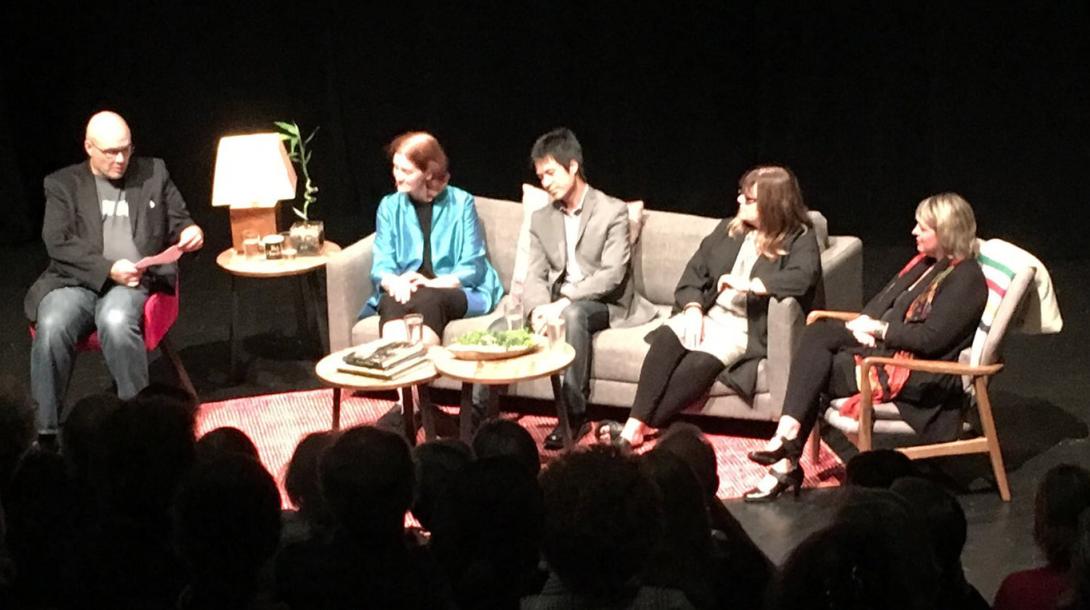Arts Trailblazers - The arts in London

I had the pleasure of moderating a panel with Andrea Halwa, Andrew Chung, Emma Donoghue, and Kathy Navackas. It was an exciting evening that explored the ups, downs, and challenges of London’s arts and culture community.
I came away from the evening with a few notes about the state of arts in our community and I thought I would share those thoughts.
The general consensus in the room is that there are a lot of exciting things happening in our community, and yet we are also not living up to our potential as a city. We need to recognize where we have strengths and differences from other communities - and celebrate those - rather than lament the things that we do not have nor control.
I was particularly fascinated by three emerging trends that came out of the evening:
-
The importance of a small-market cultural community to collaborate,
-
the collision of technology and art, and
-
the importance for London to embrace its diversity and to find ways to get improved engagement across all communities that reside inside London.
The first trend that frequently came up is the need for the art and performance groups to weave each other into their respective offerings, exploring collaborations and using the rich cultural resources within the region as part of the show being exhibited. For example, it was great to hear how London Symphonia partners with regional players, such as local planetary enthusiasts, with which they partnered on a recent performance about planets. With so many creators in the community, we have the capacity to make our local offerings stand out by bringing together some of London’s varied people, groups and skills to create an experience that is truly ‘home grown”.
The second trend was the collision of technology and art. It was widely recognized by the panel that technology has transformed how art is experienced, ranging from more interactive multimedia theatre performances to the ability to hold Skype calls with collaborators from across the globe. The ability to reach out from London to be anywhere allows our artists to live in an environment that allows their creativity to flow here rather than having to relocate to a different cultural hub. The general consensus for the group was that collaboration and global outreach will continue to be accelerated by the adoption of technology, and that's a good thing.
The third major trend I picked up is the fact that the arts and cultural experience in London is still not very representative of our population in the community, or more broadly in Canada. The theatre world is still dominated by male directors and lacking female contributions, we do not have people from various cultural communities engaging in the arts, and we have to make sure our programs, institutions and one-stage opportunities are accessible from both an ability and socio-economic perspective. Each group has to do its part at the governance and policy level, but also encourage their peers and the broader community to put energy into this cause. Engagement will not happen on its own, and there’s a recognition it will take work.
Across these major themes were a few key challenges:
-
There are still many silos within the London community, and in particular the arts and culture community, which is counter-intuitive if we see a trend towards collaboration as a key success factor for the future the arts in London.
-
There’s a sense that, artistically, we “hold back” in London, which limits us both culturally and developmentally. We need to embrace a diversity in the programming and encourage our artists to stretch themselves here in London as much as they may feel able to stretch in larger markets… and be inclusive of more perspectives and stories that both reflect our community and capture the universal human experience.
-
We need to accept that people will ‘graduate’ from London, and that is a success for our community; some world-renowned artists like Emma will continue to reside in London, others will leave. If we are creating a culture of arts, we need to see this as a positive for our community and not a slight.
Most importantly, we acknowledged and recognized that the promotion of arts and culture is a shared responsibility within our community. There is no one group, or association, or funding body that can increase the cultural and arts community in this region without the support of the community itself; residents of the audience were challenged to have one experience this year outside of their normal arts experience. For example, if you’re a regular patron at the Grand - check out the London Symphonia performance or a Fringe play. You might be surprised about the amazing cultural experiences that exist within our city.
